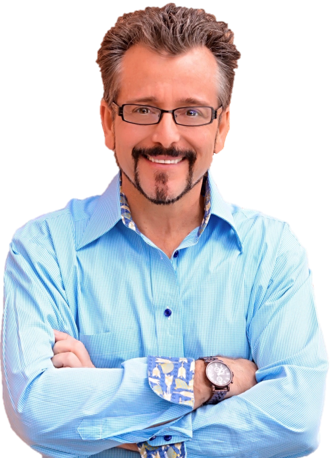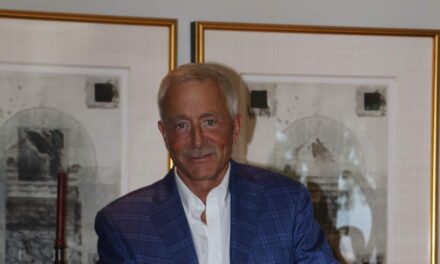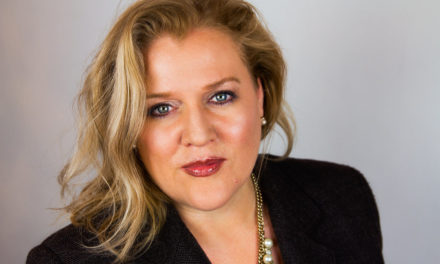
by Dr. David Friedman
DR. David Friedman is the quintessential poster child of influential people. From teacher, doctor, best-selling author, keynote speaker, syndicated TV, and radio host, to successful entrepreneur, he’s done it all! Dr. Friedman’s education includes Doctor of Naturopathy, Clinical Nutritionist and Chiropractic Neurologist. Friedman also received a post-doctorate certification from Harvard Medical School, is a Board Certified Alternative Medical Practitioner, and is Board Certified in Integrative Medicine. He’s a former teacher of neurology, author of a college textbook on neuroanatomy, and a contributing writer for a plethora of leading magazines including U.S News & World Report, Newsweek, Readers Digest, Better Nutrition, AARP Magazine, and Woman’s Word, just to name a few. His multiple award-winning, #1 national best-selling book, Food Sanity, how to eat in a world of fads and fiction, has created a paradigm shift on how people look at the food they eat.
Dr. Friedman’s list of clients has included many top celebrities like John Travolta, Jenny McCarthy, Jamie Lee Curtis, Anthony Hopkins, Val Kilmer, and Paul Newman, to name a few. Many fly across the country to see him because they trust no one else. As the health expert for Lifetime Television’s syndicated morning show and host of To Your Good Health Radio, millions of people have enjoyed his weekly, cutting-edge solutions to everyday health and wellness issues. He’s been a guest on over a hundred syndicated radio and television shows and his bestselling CD, America’s Unbalanced Diet, has sold over a million copies, helping to raise awareness about the unhealthy food people are consuming. Add to his amazing resume, CEO and product formulator for an international nutrition company and it begs the question, how can he possibly accomplish all of this in one lifetime? I got a chance to ask him that question and dig a little deeper into the disciplined mindset of this extraordinary person.
IPM: I am curious to ask you what road that lead you to where you are today, where it looks like you are inside a bowl of spaghetti?
Dr. Friedman: “I never applied myself in high school. If I wasn’t cutting class or doodling on the desk while in detention, I was spending my time playing the drums. My dream was to be a rock star and, in my mind, sitting in a classroom learning about history and math was a giant waste of my time! None of my high school teachers would have ever imagined I’d go from a long-haired rock-n-roller, wearing leather pants and an earring, to a clean-cut, cum laude graduate doctor wearing a suit and tie! It just goes to show you; sometimes boarding the wrong train in life can still lead you to the right destination.”
IPM: With all your overachievements and expertise in so many fields, and you still remain a full-time student?
Dr. Friedman: “I’m always learning, growing in my quest to help others attain their optimal health. More than half of everything I learned in college is obsolete today. The textbook all doctors learn from is called Gray’s Anatomy. It is now in its 41st edition. That means the doctors that learned from the first 40 versions were taught outdated information by today’s standards. On my radio show, I get to interview world-renowned doctors, authors, and scientists. I remember one day interviewing Dr. Earl Mindell, author of The Vitamin Bible. This book was published 35 years ago and remains the #1 best-selling nutrition books in history. I did ask Dr. Mindell how much of his original book is considered obsolete today? His answer was quite a shocker. He told my listeners that 100% of all the information he published in his original book is considered outdated today. The recommended daily allowance for vitamins changes every three-five years; so, a lot of what nutritionists recommended to their patients in 2010 is now considered wrong information. To stay up to date with our ever-changing world, I remain a full-time student.”
IPM: At the heart of everything, the fundamental belief is that healthcare is going in the wrong direction?
Dr. Friedman: “Why it’s called healthcare is beyond me.” “The medical profession primarily focuses on sick care. It’s not about preventing disease; it’s about treating it. To me, that’s like a mechanic telling you to bring in your car after you see the engine smoking. Most people understand the importance of getting an oil change, rotating their car’s tires and having it tuned up. In fact, every car comes with a factory recommended maintenance service manual. Why don’t we have one for our body?”
IPM: What do you feel is the biggest detriment currently facing our nation’s health challenges?
Dr. Friedman: “Hypocrites, the father of medicine, said ‘Let thy food be thy medicine and medicine be thy food.’ Today, the pharmaceutical industry is king, and doctors are taught not to think outside the pillbox. The sad reality is, there’s no profit in herbs, nutrition or food, so the multibillion-dollar drug industry belittles the positive clinical research on natural medicine. Instead, we are inundated with prescription drugs for whatever ails us. There are pills to help us sleep better, to help us wake up, to poop more, to poop less, to help improve our erection and drugs to help increase our concentration. Unfortunately, even our food supply has become tainted with billions of dollars’ worth of antibiotics, hormones, and pesticides. The reality is, the FOOD industry cares nothing about health and the HEALTH industry cares nothing about food.”
This is what lead me to spend over 6 years researching and writing my award-winning, #1 bestselling book Food Sanity, How to Eat in a World of Fads and Fiction. “I wrote Food Sanity after the two decades of frustration I endured as a syndicated TV and radio health expert. I’ve interviewed hundreds of scientists, doctors and best-selling authors with the goal of sharing information to help my audience reach their optimal health. Unfortunately, that’s not what happened. Instead, every guest would contradict the previous expert, leaving everyone, including me, more confused. From proponents of a Vegan, Paleo, the Mediterranean to a Gluten Free and Low Carb Diet, the opinions are as different as night and day.
For decades we were told to eat oatmeal because it helps balance blood sugar. Now we’re told to avoid grains because they spike our blood sugar! Coffee used to be considered unhealthy and today, we’re told it helps prevent disease. Eggs used to cause high cholesterol. The latest research shows that eggs contain lecithin which helps lower cholesterol. In the 1980s and ’90s, butter made us fat and we were told to avoid it. Now there’s a popular diet called ‘bulletproof,’ which advocates putting butter in our coffee to help us lose weight. After growing frustrated with so many conflicting opinions, I wrote Food Sanity. It breaks through all the facts, fads and fiction and finally answers the big question, what are we supposed to eat?!”

IPM: With so many foods and diet books on the market, what makes your book different?
Dr. Friedman: “In Food Sanity, I use a common science meets common sense approach to figuring out the culinary conundrum. Unfortunately, we can’t solely rely on scientific studies because those can change, sometimes weekly. Plus, many of them are BUYased [spelling emphasized,] meaning they are bought and paid for. PLOS Medical Journal did an interesting study on the correlation between the funding source and the researcher’s conclusion. They analyzed 206 scientific studies and looked at the relationship between the findings and the group conducting the research.
The results of this study were staggering! When the group conducting the research had a vested financial interest in the outcome, the results were eight times more favorable than when the group conducting the research was an independent third party. As the saying goes, ‘He who pays the piper calls the tune.’ I wrote Food Sanity to help decipher through all the conflicting information we are being bombarded with and I share how to make our own educated choices. I also tap into our instincts and how to rely on what your gut is telling you. Then I explore human biology and see if we are designed to eat a specific food. When you combine common science, common sense and biology, you have a full proof blueprint that shows you the best way to eat, lose weight and prevent disease.”
IPM: With all your accolades, what do you feel is the secret to your success?
Dr. Friedman: “As cliché as it sounds, never give up!” “If you have a passion for something, you’ll always have naysayers trying to derail you. People laughed at Steve Jobs when he said he wanted to create a computer so tiny it could be held in the palm of your hand and also be used as a telephone. Because of his perseverance, the majority of us own a smartphone. The Beatles were turned down by 27 record labels. They were told they didn’t have the look or the sound to be successful musicians. One record company laughed and said, ‘No one would ever buy records from a band named after an insect.’ Because the Beatles didn’t listen to their critics, they prevailed and became the most successful band in music history.”
“I spent over 6 years interviewing doctors and scientists for Food Sanity and reviewed over a thousand scientific studies. My book has received endorsements from 35 famous celebrities and respected authors including Suzanne Somers, Dan Aykroyd, Denise Austin, Jack Canfield (Chicken Soup for the Soul,) and Harvey Diamond (Fit for Life.) However, none of that mattered because publishers weren’t interested in Food Sanity. In fact, my book was originally turned down by 45 agents and 50 publishers!
Through perseverance and never taking ‘no’ for an answer, Food Sanity became a #1 national best-seller. It holds the honor of winning six first place literary awards including the prestigious International Book Awards, beating out over 2,000 entrees from around the world. Food Sanity became a #1 Barnes and Noble best-seller and a featured “top pick” in their health category. Had I listened to my naysayers and given up, I wouldn’t be where I am today. The secret to being successful is, no matter what, NEVER give up! If someone tells you no, that just means they aren’t the right fit and simply aren’t worthy of being part of your journey.”
IPM: With all the milestones you have reached, I am curious to know what is your proudest moment?
Dr. Friedman: “That’s a tough one to answer. I would probably say interviewing Andy Griffith for the feature cover story for Today’s Chiropractic Magazine, commemorating the profession’s 100th anniversary. What makes this such a defining moment for me is, I visualized it taking place two years before Andy Griffith became my patient. There are so many successful people that give visualizing the credit for their success.
A reporter once asked Hank Aaron, home run hall of fame inductee, what is his secret to hitting so many home runs? He replied, ‘Before I walk up to the plate, I visualize hitting that home run.’ Seeing something in your mind’s eye can have a profound effect on whether or not it comes to fruition.”
When it was announced in 2003 that Matlock would be filming in my city, I told my office manager, ‘2005 is the 100th anniversary of chiropractic and I’m going to interview Andy Griffith for Today’s Chiropractic Magazine’s cover feature, commemorating the profession.’ She laughed at me and said, ‘Matlock hasn’t set up production yet, and he’s not even a patient. He may not even be receptive to seeing a chiropractor, yet you already have him on the cover a magazine honoring chiropractic’s 100th anniversary?’ I replied, ‘You bet! It’s going to happen because I’m picturing it in my mind’s eye. In fact, I’ll tell you what the cover of the magazine will look like. She laughed and played along, ‘Okay, what’s the cover going to look like?’ I told her, ‘Andy is going to have on his Matlock suit sitting in a chair with a blue background.’ She called me a crazy dreamer.
Six months later, Matlock started production and I was treating several members of the cast and crew including the set hairdresser, makeup artist, and assistant director. The season ended. In 2004, Matlock returned and because of the great care I was giving cast and crew members from the previous season, I was now seeing the director, producer and all the supporting actors of the series. I asked Frank Thackery, Matlock’s director, why Andy wasn’t coming in to see me” He replied, ‘Oh, Andy laughs at all of us for coming to see you. He is not a fan of chiropractic and thinks you guys are quacks! He went to someone 40 years ago and didn’t have a good experience.’ Hearing this should have shattered my dream. After all, how would someone hating the profession ever consider endorsing it on a national magazine cover?
One night I was watching Matlock and I noticed a scene where Andy looked like he was in pain. I could see how he was guarding his back when he turned. I told Frank Thackery during his next appointment that I could tell Andy was suffering. A couple hours later the phone rang at my office. It was Andy Griffith. He told my assistant, ‘Dr. Friedman said he could tell I was in pain during a scene that aired last night. I am in pain and if my acting is no longer able to cover it up, I need to come in and see Dr. Friedman and get it fixed.’ When my office manager came to tell me Andy made an appointment, I said, ‘See, the dream is coming true!’ She laughed and said, ‘He’s not even a patient yet and isn’t a fan of chiropractic. There’s no way Andy is endorsing the profession on a magazine cover!’
Friedman continues, “Andy came to see me later that day and I gave him his first treatment. He left my office with the biggest smile on his face. Frank came in the following day and told me Andy was so happy, he was whistling after he returned to the set. The following day Andy referred his wife Cindy to see me. During one of her appointments, I asked if Andy ever did magazine article interviews? She said, ‘Oh no, he will never do them! He was misquoted once, and it didn’t show him in a positive light. He vowed to never do another interview again. In fact, People magazine once offered him six figures to do a cover feature and he declined.’
Yet another needle popping my bubble. There was absolutely no way Andy would grant me an interview knowing what I just heard.
Fast-forward to the end of 2004 and Matlock was about to wrap up the season. I decided to take a risk and ask him. The worst that could happen is I would get a no. Andy replied, ‘I can’t believe I’m gonna say this because I don’t normally do interviews but let’s do it! I’ve felt so great coming to see you and I feel bad for badmouthing the profession and I want to make it up to you guys. What do you need from me?’ I smiled from ear to ear and told him I just needed an hour of his time for the interview and a promotional photo for the cover. He told me, ‘I’ll have production get one to you this week!’
Ten days later, I received an envelope from the Matlock production coordinator. I opened it and there was a photo of Andy Griffith sitting in a chair with a blue background… exactly how I visualized it years prior!”
IPM: As a health expert for Lifetime Television’s morning show, you have interviewed celebrities and famous authors and shared many revealing topics on health and diet. I was curious to know, which was your favorite segment?
Dr. Friedman: “It would definitely be my cutting-edge feature I did on the dangers of artificial sweeteners. Back then, no one knew they contained chemicals that caused disease and contributed to weight gain. I was the first person to go on national television and expose this not so sweet truth. It ended up being a two-part feature on the health risks of consuming artificial sweeteners. America spends $25 billion on diet soft drinks. People drink them to keep from gaining weight, yet these diet drinks contain chemical sweeteners that stimulate appetite and contribute to obesity. A study at the University of Texas Health Science Center at San Antonio found that participants, who drink diet soft drinks containing artificial sweeteners, increase their risk of obesity by 41 percent for every soft drink they consume. These sugar alternatives are formulated with an array of toxic chemicals that lead to imbalances in the body and have been linked to ailments like depression, arthritis, Alzheimer’s disease, and even cancer.”
“Michael J. Fox’s Parkinson’s disease has been linked to his diet-soft-drink consumption and I wanted to include this in my feature. However, after the legal team at Lifetime Television reviewed the script, they excluded that part of the segment. They were concerned there just wasn’t enough proof, and, of course, that meant possible legal repercussions. I refused to sit back and allow such an important part of this feature get the ax. I forwarded the powers that be a plethora of evidence, including compelling research conducted by James Bowen, M.D., and Arthur M. Evangelista, former FDA investigator, showing aspartame is a powerful neurotoxin. I included “Evidence File #6: Aspartame & Parkinson’s Disease” submitted by Mark D. Gold with the Aspartame Toxicity Information Center. After reviewing this research and more, I was given the thumbs up by the legal team at Lifetime and my segment aired to rave reviews. I received over a thousand letters from happy viewers that got off artificial sweeteners following my segment. Many of them said they felt better, could think better, sleep better and could finally lose those unwanted pounds.”
IPM: With so many food myths debunk in your book Food Sanity, what is the biggest misconception when it comes to food?
Dr. Friedman: “The biggest food myth is the belief that cow’s milk does a body good.” Friedman explains, “We are taught as children if we want to grow up big and strong, we need to drink milk. Yet children that drink milk get more chronic ear infections, have more allergies, are more likely to be overweight, and are at greater risk of diabetes. Despite decades of government and industry propaganda about the health benefits of dairy products, unbiased science proves that cow’s milk is not healthy for humans.”
IPM: What about the need for calcium in milk?
Dr. Friedman: “People have been misinformed about milk’s ability to help make bones strong. Milk does contain calcium; however, before it goes to the grocery store, it’s pasteurized, meaning it’s been exposed to extreme heat. This heating process is required to destroy bacteria, but it also renders a lot of milk’s calcium content insoluble. It’s destroyed during the manufacturing process.”
IPM: If drinking raw unpasteurized milk would solve this problem?
Dr. Friedman: “It still wouldn’t give you enough magnesium needed for the body to absorb the calcium. The calcium to magnesium ratio in cow’s milk is 9 to 1 (90 percent calcium/10 percent magnesium). Most experts agree we need a ratio of 1 to 1 (50 percent calcium/50 percent magnesium) for bone growth. When you look at plants, you can attain the perfect balanced ratio of calcium and magnesium. Sources like almonds, squash, sesame seeds, and spinach offer almost a perfect 1 to 1 ratio of calcium to magnesium. These ratios allow the two bone-building partners calcium and magnesium to do their job.”
IPM: What about drinking milk for its protein content?
Dr. Friedman: “A major reason why cow’s milk is bad for us it is because of a protein it contains called casein. Casein from cow’s milk is also used to make glue to hold together wood (think of the cow logo on Elmer’s Glue.) When you ingest casein, a glue-like substance in milk, your body attacks it by producing histamines, which cause mucus production that can lead to bronchitis, allergies, asthma, sinus and ear infections, irritable bowel syndrome, and diarrhea.
Numerous studies, including data from the World Health Organization (WHO), have also linked consumption of casein with an increased risk of heart disease, high cholesterol, and type 1 diabetes. Keep in mind, casein is what makes a 100-pound baby calf grow into a 2,000-pound cow. The average human baby weighs less than 8 pounds and grows into a 170-pound adult. Just like we wouldn’t use rocket fuel in the gas tank of a moped, we shouldn’t use gargantuan-size cow fuel inside our human body. There are so many delicious and healthy, dairy-free alternatives available like cashew milk, almond milk, hemp milk, and coconut milk.”
IPM: With all the work-related things you juggle with, I wondered if there is anything you do for fun?
Dr. Friedman: “Yes, while my high school dream of being a professional musician never came true, I still play the drums regularly and it’s my true escape away from work. I’m particularly fond of an instrument called the hand pan. This metal percussion instrument which has the shape of a UFO originated in Switzerland in the ’80s. Its rich overtones have an ethereal and hypnotic sound that emanates in all directions and captivates listeners.”
To learn more about Dr. Friedman visit DrDavidFriedman.com. His book Food Sanity, How to Eat in a World of Fads and Fiction is available everywhere books or sold, or you can visit FoodSanity.com. You can follow Dr. Friedman on Facebook and Twitter @DrDavidFriedman and on Instagram @DrDFriedman.

Dr. David Friedman is an award-winning, #1 national best-selling author, Doctor of Naturopathy, Clinical Nutritionist and Chiropractic Neurologist. He received post-doctorate certification from Harvard Medical School, is Board Certified in Integrative Medicine, a registered Naturopathic Diplomate and is a Board Certified Alternative Medical Practitioner. He’s been featured in many national magazines including: Newsweek, U.S News & World Report, Readers Digest, AARP Magazine, Woman’s World and Better Nutrition, just to name a few
He’s appeared on over a hundred syndicated radio and television shows. His list of clients have included many top celebrities like John Travolta, Jenny McCarthy, Jamie Lee Curtis, Val Kilmer, and Patrick Swayze, etc. As the health expert for Lifetime Television’s syndicated morning show and host of “To Your Good Health Radio,” millions of people have enjoyed his weekly, cutting-edge features, offering solutions to everyday health and wellness issues. ~Dr. David Friedman
https://doctordavidfriedman.com/
FB: drdavidfriedman/ TW: Dr David Friedman LinkedIn: Dr. David Friedman
Instagram: Dr David Friedman




